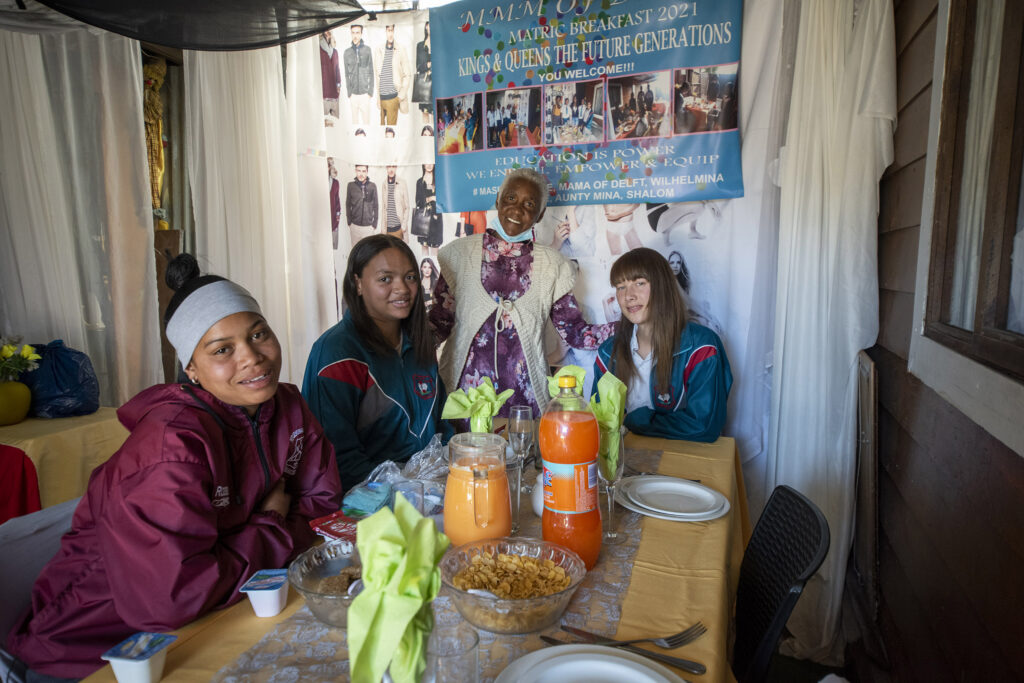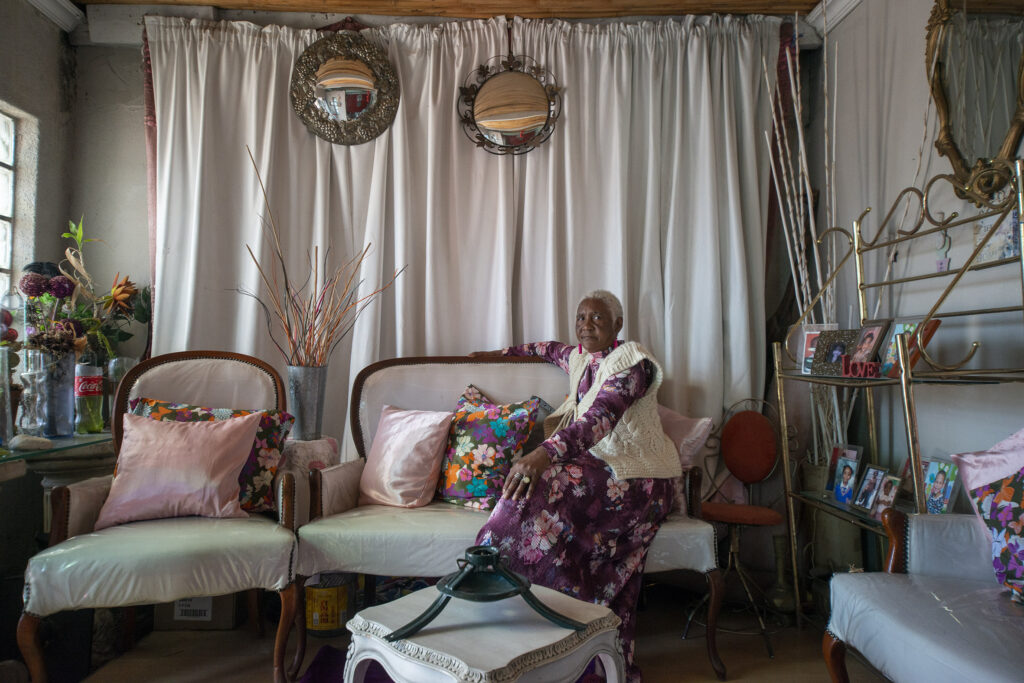Place of refuge: Marlene Patterson with a platter of food for the pre-matric exam breakfast in Wilhelmina Heynes’ home in Delft. Heynes, otherwise known as Aunty Mina, has been offering support to children for so long that some of those attending her matric breakfast joined her after-school programme when they were in grade one. Photos: David Harrison
The matric breakfast is a red carpet event. It has been a daily event during matric exams since 2015 and the only requirement is that you are writing your final exam.
Led by Wilhelmina Heynes, better known as Mama Delft or Aunty Mina, and three co-workers, breakfast is served daily from 7am until noon for matric learners in The Hague in Delft, on the Cape Flats.
The purple house on the corner of Dulles and Boeing streets, with its flowers towering higher than the brick wall, the sun shaped ornament next to the front door where “Shalom” is neatly written above, is an oasis for grade 12 learners.
“It is very peaceful, I can think about a lot of stuff when I sit here,” says one matric learner, who is used to living with six people.
Sitting at the breakfast table, a few hours before writing her final geography paper, she says: “When we come here we eat more than we usually do. It means a lot. This year was difficult to learn, there were a lot of challenges. But here they also motivate you. I feel better. I feel motivated when I sit in the class now”.
Learners, who would generally eat at the most a bowl of porridge, now have the choice from a full-on three-course continental breakfast: two types of porridge, fruit salad, yoghurt, juice, a platter with sausages, eggs, chicken nuggets and a chocolate-to-go — and for newcomers there are toiletry packs.
When learners don’t write an exam but want breakfast, they know they can still come and sit down, says Aunty Mina.
“Hulle moet lekker leer en lekker slaag, they must not feel hungry,” says Aunty Mina,
“We want them to know people are standing behind them.”
The matric breakfast is only one division of the nonprofit organisation, Masithembele, founded by Aunty Mina 16 years ago after she received training from the department of social development on how to assist people with HIV.
“In one month I had 15 people in one street I was helping who had HIV,” recalls Aunty Mina. This led to her establishing the Masithembele HIV & Aids Enrichment Centre.
 Meals for matrics: Wilhelmina Heynes along with grade 12 learners (from left,above) Rodene Kamfer, Julene Allies and Alvena Nissen gather around the special pre-exam breakfast table that Heynes offers to learners ahead of their final matric exams. Photos: David Harrison
Meals for matrics: Wilhelmina Heynes along with grade 12 learners (from left,above) Rodene Kamfer, Julene Allies and Alvena Nissen gather around the special pre-exam breakfast table that Heynes offers to learners ahead of their final matric exams. Photos: David Harrison
In addition, Masithembele facilitates a loss and grief programme at schools, a drop-in centre for children and adults in need and an after-school programme, while also continuing with its weekly support groups for people living with HIV.
Masithembele’s after-school programme accommodates nearly 60 children daily, sometimes more, at Mandela Peace Park in Delft. Aunty Mina affectionately points out that some of the children who came to the after-school programme in grade R and grade one are now also attending the matric breakfast.
Avril Gordon, who facilitates the loss and grief programme and serves the matrics breakfast, says: “It is not easy. I thought the older children are dealing with difficult issues, but the [younger] children are worse.”
The programme is focused on children between grade one and three who have lost a sibling or another family member.
“Death stands in front of everyone’s door, but there are children who cannot cope with it,” she says.
Gordon recalls a case where two siblings were separated after losing both their parents when the father burned down their Wendy house. The father threw the children out before burning his wife and himself.
This week they counselled an eight-year-old girl whose father shot her uncle in front of her.
“You must be strong when facilitating the programme, you deal with a lot of emotions, but if you can help the children it makes you feel good,” Gordon says.
Aunty Mina’s daughter, Christelle Wheeler, who recently took the reins from her mother, says hunger and poverty is the biggest hill for many in Delft. “People don’t have the basic needs to cope every day.”
Wheeler leads the drop-in centre. “We don’t cope, we don’t have enough food for the people walking in, but we don’t send people away without anything,” says Wheeler.
Aunty Mina has lived on the Cape Flats all her life and has seen how her world has changed, especially in the past 18 months. She contracted Covid-19 and never fully recovered. She is constantly short of breath and this limits her work. But she still continues.
She walks to the Mandela Peace Park, which is about a kilometre from her house, to the after-school programme.
“My passion has always been to serve my community. I live by the phrases of enrich, empower and equip. Creating spaces where young people can be educated will empower the children from this area. That gives them a future.”
Do they need more money?
It is Aunty Mina who answers. “Money is important, but it must not be about money. What if your money dries up, then you stop everything?”
 Wilhelmina Heynes, along with the help of Charmiane Kok and Marlene Patterson, provides local matriculants with a red-carpet experience at her home in Delft, serving a healthy breakfast and motivational talks ahead of their final exams. Photo by David Harrison
Wilhelmina Heynes, along with the help of Charmiane Kok and Marlene Patterson, provides local matriculants with a red-carpet experience at her home in Delft, serving a healthy breakfast and motivational talks ahead of their final exams. Photo by David Harrison
She recalls the 14 years she had Masithembele without a constant flow of income.
She says, “Without money, there are certain things you cannot do,” referring to, among other things, the monthly R553 they pay for the Food Bank in Epping. The Food Bank collects produce that has just reached its expiry date from macro companies and distributes it to nonprofit organisations.
“But remember, at the end of the day, I also want to make the person God sent over my path a better person, there must be a change in the person’s life,” says Aunty Mina, while sitting at one of the tables where matrics are having breakfast.
Nothing is overlooked in the neat room that can host 15 matrics at a time. There is detail in everything, from the way the serviettes are folded in a cocktail glass and the plates set from small to large to balloons along the walls and the fashionably red carpet at the entrance, leading the matrics to the tables.
“They sit, and we serve them. They are the kings and queens, the future generation,” says Gordon.